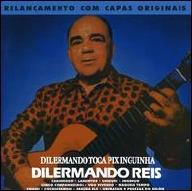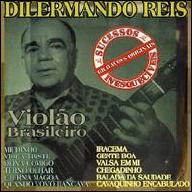Reis remained an accomplished violonista, and his compositions are still performed today in the traditional rodas de choro and being recorded. As a professor, Reis counted among his disciples the president Juscelino Kubitschek and the violonistas Bola Sete and Darci Vilaverde. Reis was the son of a violonista (acoustic guitar player), Francisco Reis, who was also his first teacher. At 17, Reis attended a recital in his city of Guaratinguetá by the violonista Levino da Conceição. Excited by the dexterity of the blind musician, Reis became his accompanist throughout the tour of upcountry Brazil. After a while he moved to Rio de Janeiro, where he became a violão teacher in the prestigious traditional music stores of those times (which still exist to this day), Bandolim de Ouro and Guitarra de Prata. In 1935, he opened on Radio Clube do Brasil, presented by Renato Murce. Soon his mastery at the accompaniment of the great singers of those times was widely acknowledged, and he became active in other radios, including the most prestigious Rádio Nacional, where he worked until 1969. On August 18, 1936, Elizeth Cardoso began her professional career in the show Programa Suburbano (Rádio Guanabara), which was held by performers like Reis himself, Vicente Celestino, Noel Rosa, Aracy de Almeida, and others. Reis's first 78 came out in 1941, with his waltz Noite de Lua and his choro Magoado. In the period between 1941 and 1942 he joined an orchestra of violões which enlivened sophisticated evenings at the Cassino da Urca, performing also in the Rádio Clube do Brasil. In 1953, he toured the U.S., recording for CBS. His waltz Abismo de Rosas, still popular to this day in some circles, was one of the most expressive recordings for Continental (Brazil) during the fertile period between 1950 and 1960. In 1972 he recorded the LP Dilermando Reis Interpreta Pixinguinha and in 1975, released O Violão Brasileiro de Dilermando Reis, both for Continental. ~ Alvaro Neder, Rovi
Dilermando Reis
September 22, 1916 (age 109)
Biography
Dilermando Reis is an icon of the Brazilian violão. His anachronistic style of playing and composing -- fully romantic, plangent -- is still regarded sentimentally by many today. In his vast discography (he recorded until two years before his death at 61), his love for the past was responsible for the rediscovery of the great composer João Pernambuco. With a gap of several decades since Pernambuco's death, the awarded classical guitarist Turíbio Santos began to register Pernambuco's works.
Top Tracks
Albums
Videos
Close














